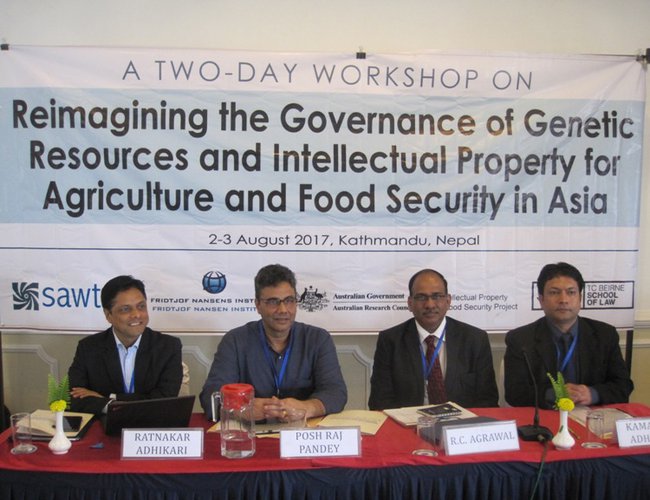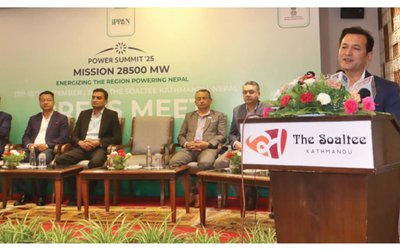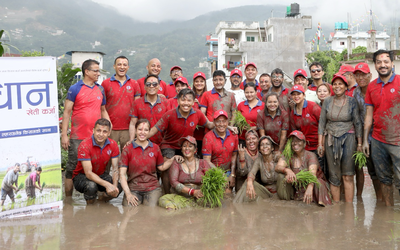
A two-day workshop titled 'Reimagining the Governance of Genetic Resources and Intellectual Property for Agriculture and Food Security in Asia' opened. Organized by South Asia Watch on Trade, Economics and Environment (SAWTEE), together with the ARC Laureate Project on Intellectual Property and Food Security at the University of Queensland and Fridtj of Nansen Institute (FNI), the workshop aimed to discuss policy options to safeguard the rights of farmers and breeders in the Asia-Pacific countries.
The two-day workshop discussed the options to address the interests of all relevant public and private stakeholders including farmers, breeders and seed traders. The workshop aims to critically assess the arrangements related to plant genetic resources in national laws and international agreements such as the Agreement on Trade-Related Aspects of Intellectual Property Rights (TRIPS) of the World Trade Organization (WTO), the Convention on Biodiversity, and the International Union for the Protection of New Varieties of Plants (UPOV).
“This issue is highly relevant to Nepal as the country is currently exploring options to create policy and legal space for the rights of farmers and breeders, for example, in its draft law on plant variety protection and the existing Seed Act and Seed Regulations,” said a press release issued by SAWTEE.
The experts present at the inaugural session of the workshop emphasized the need for a policy regime that can ensure that the communities which spend generations preserving and innovating plant genetic resources are rewarded. Such a regime should be able to provide due recognition to the farmers and breeders through intellectual property rights, and offer them a share in benefits derived from the use of their traditional knowledge which they have honed for generations.
Stressing the importance of plant genetic resources to sustain agriculture, Dr. Posh Raj Pandey, Chairman of SAWTEE, pointed out that seeds and seedlings are as important as soil, water and sunlight for farming but these very elements get less attention in academic and policy discourse in Nepal. He stressed the need for the governance of genetic resources to empower the farming community.
Dr. Ratnakar Adhikari, Executive Director of the Enhanced Integrated Framework (EIF) at the WTO pointed out that research and development in agriculture is not limited to scientists and laboratories but takes place in the field by farmers. It is critically important that communities that have spent generations preserving and innovating the genetic resources are rewarded, he said, pointing out that balancing breeders' right with rights of farmers is a challenge.
Among the developing countries, India is the only country that has adopted sui generis system to govern plant genetic resources. Sharing the experience of India, Dr. Rakesh Chandra Agrawal, Registrar General at India's Protection of Plant Varieties and Farmers' Rights Authority said that registration of plant genetic varieties had a slow start but now two-thirds of the total registrations are coming from the farmers' side. Discussing the Indian plant variety protection law, he pointed out that India even protects farmers from prosecution in cases of innocent infringement. India had legislated the Plant Variety Protection and Farmers' Rights Act- PPVFR Act in 2001, implementing a plant variety protection regime that protects the rights of both breeders and farmers.
Dr.Kamalesh Adhikari, Research Fellow, TC Beirne School of Law, The University of Queensland Australia, pointed out that protecting the interests of plant breeders and farmers offers opportunities in areas of agriculture, food security and the use of plant genetic resources. Failing to create own kinds of sui generis plant variety protection regimes may not only restrict the ability of Asian countries to strengthen farmers’ seed systems, but may also prevent them from protecting farmers’ rights over seeds and traditional knowledge. This is because while making an attempt to protect breeders’ rights over modern plant varieties through an intellectual property system, Asian countries may find it difficult to create a legal space that smallholder farmers need—for example for farmers who rely on the conservation, saving, use and regular exchange of seeds of both modern and native plant varieties.
Various papers were presented on the basis of experience of different countries, including Nepal, India, Bangladesh, Pakistan, Sri Lanka, Timor-Leste, Thailand and Ecuador regarding the governance of genetic resources and intellectual property.
- MELAMCHI WATER SUPPLY: No Interruption During Monsoon
- Jun 25, 2025
- KOREAN RETURNEES: Successful Integration
- Jun 25, 2025
- UPPER TRISHULI-1: Engaging With Local
- Jun 25, 2025
- IME GROUP: Twenty Five Years Of Journey
- Jun 24, 2025
- NEPAL’S AIR POLLUTION: A Growing Health Concern
- Jun 24, 2025















